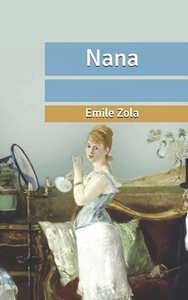You need to sign in or sign up before continuing.
Take a photo of a barcode or cover
dark
funny
reflective
slow-paced
Plot or Character Driven:
Character
Strong character development:
No
Loveable characters:
Complicated
Diverse cast of characters:
No
Flaws of characters a main focus:
Yes
adventurous
dark
funny
medium-paced
Plot or Character Driven:
A mix
Strong character development:
Complicated
Loveable characters:
Yes
Diverse cast of characters:
No
Flaws of characters a main focus:
Complicated
"Somente ela ficava de pé, no meio das riquezas empilhadas do palácio, com um montão de homens abatidos a seus pés. À semelhança daqueles monstros antigos, cujo domínio temido estava coberto de ossos, ela punha os pés sobre crânios; e rodeavam-na catástrofes (...). A sua obras de ruína e de morte estava feita, a mosca que voara da porcaria dos arrabaldes, que trazia o fermento das podridões sociais, tinha envenenado aqueles homens, bastara-lhe poisar neles. Estava bem, era justo, vingara o seu mundo, os vadios e os abandonados. E enquanto, numa glória, o seu sexo subia e refulgia sobre as vítimas lançadas por terra, semelhante a um sol nascente que ilumina um campo de carnagem, ela conservava a sua inconsciência de animal soberbo, ignorante da sua obra, sempre boa rapariga."
Que portento de livro. Que escalada horrenda de depravação e degradação. Não sei se gostei. Também acho que não era para gostar. Mas é fascinante, de uma forma sórdida. Como uma sociedade se destrói por causa de um pedaço de carne humana... E como uma mulher perfeitamente oca, subida da miséria à custa do seu corpo com todos os ressentimentos que ela traz, pode tão inconscientemente levar tantos à ruína. E como eles são imbecis. Todos eles, sem excepção. E hipócritas. Nem sei que diga. Não adorei. Entediou-me, até, de tão sórdido que era. Tinha demasiadas personagens. Mas é brilhante.
Que portento de livro. Que escalada horrenda de depravação e degradação. Não sei se gostei. Também acho que não era para gostar. Mas é fascinante, de uma forma sórdida. Como uma sociedade se destrói por causa de um pedaço de carne humana... E como uma mulher perfeitamente oca, subida da miséria à custa do seu corpo com todos os ressentimentos que ela traz, pode tão inconscientemente levar tantos à ruína. E como eles são imbecis. Todos eles, sem excepção. E hipócritas. Nem sei que diga. Não adorei. Entediou-me, até, de tão sórdido que era. Tinha demasiadas personagens. Mas é brilhante.
slow-paced
Could not engage with the plot or characters. I admire the female representation of Nana in 1880s France and how she defied the stereotypical powers of women but I could not engage with the story.
This book was so outrages in parts, it was hard for me to believe it was written in the 19th century.
Lots of detailed descriptions, which fits with it being a realistic novel.
Nana is one of those heroines, who has many faults, and who conducts herself very badly most of the time, but you still can't help liking her. A poor, young woman in a man's world who managed to conquer a little corner for herself by using those rich men who put her (and her family) down in the first place.
The book ends dramatically and gets you thinking about what the actual moral here is. Is the book trying to show us that women who try to rise so highly in a man's society are doomed to a painful failure? Or is it trying to show us how depraved society really is? Or perhaps it tries to warn us off wallowing in money and befriending whores.
Whatever it is, this is a powerful book.
Lots of detailed descriptions, which fits with it being a realistic novel.
Nana is one of those heroines, who has many faults, and who conducts herself very badly most of the time, but you still can't help liking her. A poor, young woman in a man's world who managed to conquer a little corner for herself by using those rich men who put her (and her family) down in the first place.
The book ends dramatically and gets you thinking about what the actual moral here is. Is the book trying to show us that women who try to rise so highly in a man's society are doomed to a painful failure? Or is it trying to show us how depraved society really is? Or perhaps it tries to warn us off wallowing in money and befriending whores.
Whatever it is, this is a powerful book.
reflective
slow-paced
Plot or Character Driven:
Character
Strong character development:
Yes
Loveable characters:
Complicated
Flaws of characters a main focus:
Yes
challenging
dark
emotional
funny
sad
tense
slow-paced
Plot or Character Driven:
Character
Strong character development:
Yes
Loveable characters:
Complicated
Diverse cast of characters:
Yes
Flaws of characters a main focus:
Yes
Some terribly lovely prose, vivid depictions, wild scenes, and complex characters. But Zola fails to achieve the realistic, deep characterization of Tolstoy despite a good deal of skill because he gets in his own way. The quality was ultimately diluted for me after doing some research into Zola to understand the intentions. He was, in directly stated views in life, supportive of women. However, Nana is not just a one-off character used to reflect the Second Empire, attack social vices, or depict hereditary ills.
In Zola’s fictional depictions, I learned, the only good woman is a virgin or a mother (even better if she could be a virgin mother, somehow…but how? Think, brain, think). It’s just one example of how he seems to have lost his clarity and intentions when he put pen to paper, which is only charming as long as it doesn’t directly contradict his main themes. (You can’t effectively depict a woman who acts a certain way because of her background or society’s vices, if you can only emotionally conceive of a sexual woman as a serpent.) He was against the church’s restriction of women and focused on writing very realistic prose, yet in practice his females are archetypes neatly matching the Catholic view of his day and his prose in Nana becomes increasingly feverish, dramatic, and nearly surreal.
The complexity of Nana’s character in the first half slowly loses ground to a simply cruel madwoman who revels in destruction and whose lack of maternal responsibility causes her own untimely and gruesome demise. There’s a sense of inconsistency and lack of unified focus in the novel. It’s a great novel, but I docked half a star for Zola’s sexist subconscious and how the book goes a little…GoT finale.
In Zola’s fictional depictions, I learned, the only good woman is a virgin or a mother (even better if she could be a virgin mother, somehow…but how? Think, brain, think). It’s just one example of how he seems to have lost his clarity and intentions when he put pen to paper, which is only charming as long as it doesn’t directly contradict his main themes. (You can’t effectively depict a woman who acts a certain way because of her background or society’s vices, if you can only emotionally conceive of a sexual woman as a serpent.) He was against the church’s restriction of women and focused on writing very realistic prose, yet in practice his females are archetypes neatly matching the Catholic view of his day and his prose in Nana becomes increasingly feverish, dramatic, and nearly surreal.
The complexity of Nana’s character in the first half slowly loses ground to a simply cruel madwoman who revels in destruction and whose lack of maternal responsibility causes her own untimely and gruesome demise. There’s a sense of inconsistency and lack of unified focus in the novel. It’s a great novel, but I docked half a star for Zola’s sexist subconscious and how the book goes a little…GoT finale.
challenging
reflective
medium-paced
Plot or Character Driven:
Character
Loveable characters:
No






